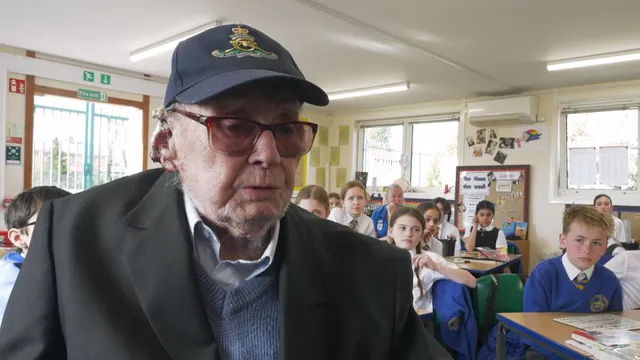
103-year-old veteran shares war stories with schoolchildren
2025-03-22 00:01- Tom Jones, a 103-year-old Second World War veteran, spoke to primary school children in Salford about his wartime experiences.
- He served in the Royal Artillery starting at age 17 and was deployed to Burma after defending the Liverpool Docks.
- His participation in the VE Mail project allows young students to connect with history through personal stories from veterans.
Express your sentiment!
Insights
In Salford, England, a 103-year-old veteran, Tom Jones, recounted his experiences during the Second World War to primary school children. The event took place as part of a project commemorating the anniversary of Victory in Europe (VE) Day. Tom was only 17 when he was called to serve in the Royal Artillery at the outbreak of the war in 1939, spending significant time defending the Liverpool Docks before being deployed to Myanmar, previously known as Burma, where he served for four years until the war’s conclusion in 1945. This project, known as the VE Mail initiative, allows veterans to write personalized letters sharing their experiences with students across the UK. Schools can apply to participate, and in return, students are encouraged to write letters in response, fostering an educational connection to their history lessons. During his visit to James Brindley Community Primary School, Tom shared various stories from his time in Burma, including his work as a wireless operator in challenging jungle conditions and his interactions with Gurkha soldiers, whom he regarded as outstanding fighters. In recounting these experiences, he aimed to educate the youth about the harsh realities of war, noting the lack of documentation at the time. The history teacher at the school, Adele Jewell, highlighted how impactful it was for the students to hear firsthand accounts from someone who lived through the events they study in class. This direct engagement brings history to life and deepens student understanding. Tom's story incorporated both humorous and poignant moments, shedding light on the personal sacrifices he faced, including missing his wife during his deployment. Such initiatives not only honor the memory of past soldiers but also serve as vital educational tools to ensure that future generations recognize and learn from history.
Contexts
The Second World War was a monumental event that shaped the course of history, and the experiences of the veterans who served during this time are invaluable. Many of these veterans possess a wealth of knowledge, personal stories, and insights that are crucial for understanding the complexities of the war. Sharing their stories not only honors their sacrifices but also preserves the memory of the events that transpired. The importance of these narratives cannot be overstated, as they provide a human perspective to the historical events that are often discussed in abstract terms. It is through these personal accounts that we can grasp the realities of war, the impact on soldiers and their families, and the lessons learned from those tumultuous years. Veterans have expressed how sharing their stories is therapeutic, allowing them to process their experiences and connect with those who were affected by the war in various ways. Many veterans recount their profound sense of camaraderie with fellow soldiers and the bonds formed under extreme circumstances. These relationships were critical for survival and morale, highlighting the resilience of the human spirit in the face of adversity. Additionally, through the sharing of their experiences, veterans hope to educate future generations about the realities of war, instilling a sense of responsibility and awareness regarding peace and conflict. They provide firsthand accounts of both the valor and tragedy that occurred, enriching our understanding of the global consequences that continue to resonate today. Moreover, veterans’ narratives often challenge prevailing myths and misconceptions surrounding the war. By documenting their unique perspectives, we are able to confront the romanticized notions of heroism and valor that can overshadow the grim realities of combat. These stories can vary widely, encompassing experiences from different theaters of war, various roles within military operations, and personal challenges faced long after the conflict ended, such as dealing with PTSD and reintegration into civilian life. Such diversity in narratives reveals the multifaceted nature of the war and underscores the importance of considering personal experiences as a lens through which to view historical events. In conclusion, as we commemorate the sacrifices of World War II veterans, it is crucial to encourage the preservation and sharing of their stories. Communities, historians, and educators have an important role to play in ensuring these voices are heard and documented. Organizations dedicated to veteran affairs can facilitate opportunities for storytelling through interviews, written accounts, and public discussions. By actively engaging with these narratives, we not only honor the past but also foster a better understanding of the implications of war and the ongoing quest for peace in our world.